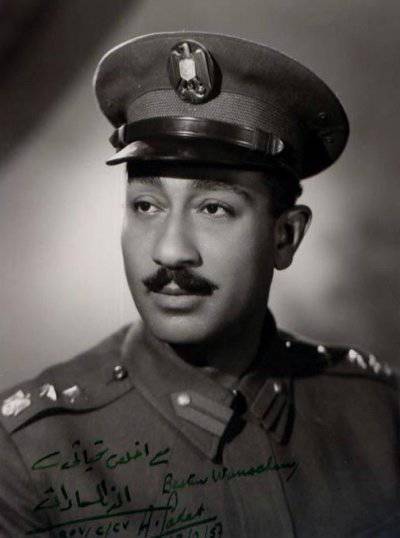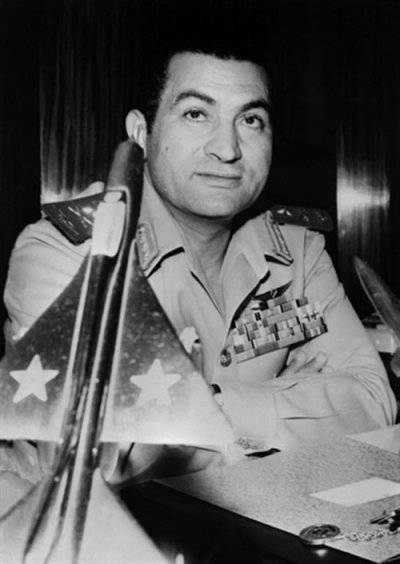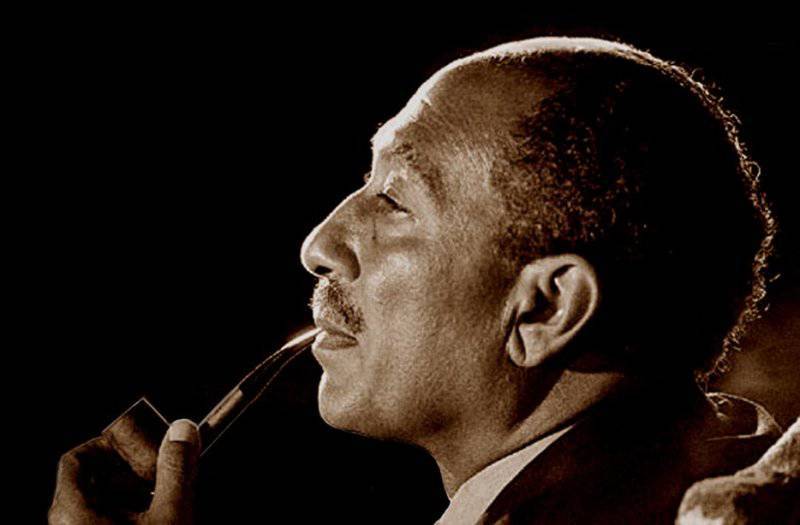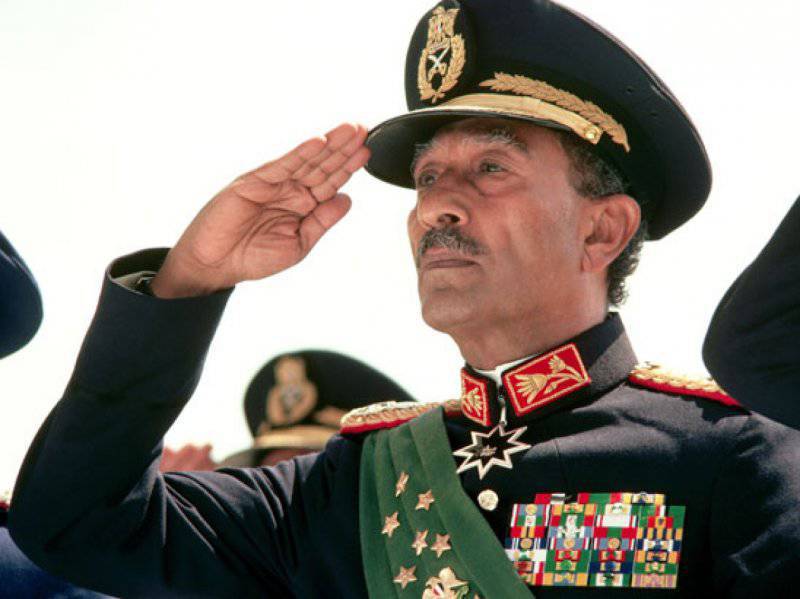War and peace hero
In the rank of lieutenant Anwar Sadat went to serve in southern Egypt in the communications unit. Here, in 1940, he, along with Nasser and a dozen officers, organized a secret fraternity in the name of liberating the country from the yoke of the British. The fact is that Egypt has long been a British colony.
Despite the fact that in the 1922 year, the country gained independence, in fact, England continued to solve all the important issues relating to the political and military sphere. Not surprisingly, from childhood, Anwar hated the British fiercely. On this basis, he became very close to the Muslim Brotherhood and Misr al-Fatat nationalist organizations.
During the Second World War, Egypt took a neutral position. However, Sadat could not stay away. Deciding to free his country from some invaders, he began to cooperate with others. Soon he was arrested, but for lack of evidence, he was soon released. The young military man returned to his underground activities and was surrendered by two arrested agents of the Third Reich. In the fall of 1942, according to the decision of the military tribunal, Anwar Sadat was demoted to the rank and file, dismissed from the army and imprisoned. Two years later, he was able to escape from the prison hospital, where he landed as a result of a hunger strike. For a whole year, Anvar changed his appearance and hid, doing low-paid work.
When the war ended, Anwar stopped hiding, but in 1946, he found himself in prison again on a false charge. The trial lasted three years, and Sadat was acquitted only in 1949. In 1950, he was able to recover in the army. He returned to Nasser’s secret fraternity, which by then had become a large organization called the Free Officers. Using his experience, Sadat served as a liaison between this group and the terrorists of civilians stationed in Sinai. 22 June 1952 of the year "Free Officers" conducted a bloodless coup, in which Sadat took an active part. Under his supervision, King Farouk I was expelled and went into exile.
Gamal Abdel Nasser concentrated in his hands the full power, and Anwar Sadat, remaining in his shadow, worked for many years in various government posts.
Until 1970, Sadat worked as chairman of the National Assembly, replaced Nasser on trips abroad, was one of his vice-presidents. Sadat never claimed leading roles, carefully concealing his vanity and abilities. He later said: "If Nasser finds ambition in you, then you have died." For his weakness in dealing with a number of issues, Sadat received the offensive nickname “Poodle Nasser” among his comrades. In 1969, Nasser, exhausted by disease, fell into extreme suspicion and removed all vice-presidents except Sadat from power, and on September 28 on 1970, he died as a result of a heart attack.
In order to determine the candidacy of the new president in Egypt held elections. It should be noted that in those days the atmosphere was extremely tense around young Israel. Hostile Arab countries periodically resorted to armed attacks, while Israelis in the 1967 year responded by seizing the Sinai Peninsula and the Gaza Strip. Gamal Nasser was able to conclude a shaky truce with Israel, but Sadat, correctly guessing the mood of the crowd, vowed to return the land. In the 1970 election year, Anwar Sadat received more than ninety percent of the vote and became the president of Egypt. So began a new phase of his life.
At first, after the elections, no one in the world believed that Sadat would hold out for long at the helm of power. And his first actions only confirmed it. Sadat did not take any military action against Israel, as many had expected from him, but on the contrary concluded a new truce.
Egypt at that time was a typical Arab socialist state. The Soviet Union had a strong influence on him, all political parties were banned, banks and industry were nationalized. The colossal armament expenditures broke down the country's economy, and the Arab peasants - the Fellahs refused to live in communes. Anwar Sadat was not a stupid man, his first steps were very careful in order to lull the vigilance of the Soviet side. The arrest of popular members of the Arab Socialist Union supporting the USSR, led by Vice President Ali Sarbi, was accompanied by the signing of an agreement on friendship and cooperation with our country (May 1971). In the summer of next year, Sadat demanded that fifteen thousand Soviet specialists be removed from the country and immediately opened Egyptian ports for the Soviet Navy fleet. Such a policy gave Sadat the opportunity to strengthen his power, continue to receive weapon from Moscow, and simultaneously begin negotiations with the United States.
 By 1973, negotiations with Tel Aviv reached an impasse, the occupied Sinai Peninsula did not give Arabs peace, and mass anti-Zionist speeches took place in the country. Sadat was constantly pressured, he became the main target of criticism, and more and more often there were accusations of ineffective leadership. Since there were no clues from Washington and Moscow, the only way out for the president was the war with Israel. He wrote that "it is time to retaliate, and the battle is inevitable." The Soviet Union, after a number of military and political privileges granted, gave its consent to a limited offensive and increased the supply of weapons, equipment and ammunition to Egypt. Sadat received more military supplies in the eight months before the start of the conflict than in the two previous years. Finally, after a series of hidden preparatory operations and with the support of Syria on October 6 of 1973, Egyptian troops attacked the Israelis. The date was not chosen by chance, on this day the Jewish holiday "Yom Kippur" or "Judgment Day" was held - one of the main events in Judaism.
By 1973, negotiations with Tel Aviv reached an impasse, the occupied Sinai Peninsula did not give Arabs peace, and mass anti-Zionist speeches took place in the country. Sadat was constantly pressured, he became the main target of criticism, and more and more often there were accusations of ineffective leadership. Since there were no clues from Washington and Moscow, the only way out for the president was the war with Israel. He wrote that "it is time to retaliate, and the battle is inevitable." The Soviet Union, after a number of military and political privileges granted, gave its consent to a limited offensive and increased the supply of weapons, equipment and ammunition to Egypt. Sadat received more military supplies in the eight months before the start of the conflict than in the two previous years. Finally, after a series of hidden preparatory operations and with the support of Syria on October 6 of 1973, Egyptian troops attacked the Israelis. The date was not chosen by chance, on this day the Jewish holiday "Yom Kippur" or "Judgment Day" was held - one of the main events in Judaism.In the first two days, the Egyptian and Syrian armed forces made significant strides. Their armies, flooding the Sinai Peninsula and the Golan Heights, began to advance deep into Israel. However, at this moment, some "oddities" began in the behavior of the command of the Egyptian troops. According to many military historians, the Arabs had a double superiority in tanks and artillery, as well as everything needed to defeat the Israeli forces in Sinai. But according to orders received from above, their forces stopped, not building on their success, which allowed the Israelis to regroup and launch a counteroffensive. They stopped the Syrians and threw the Egyptians behind the Suez Canal.
The final chord of the offensive of the Israelis looked very impressive, after eighteen days of continuous fighting their tanks were eighty kilometers away from Cairo. By this time, Israel was already in full control of the Holland Heights, the Gaza Strip and the west of the Jordan River. Seeing that the situation was completely out of control, Anwar Sadat continuously sent messages to the leaders of the United States and the leaders of the USSR, urging them to take measures to stop the hostilities. On October 22, the UN Security Council approved two resolutions on an immediate cease-fire with all troops stopped in their positions. October 25 1973 year of the fighting stopped. Without a second thought, Sadat agreed to a truce, which the Palestinians never forgave him. The United States of America, which had its own interests in the regions, tried to alleviate tensions between the parties and even secured the return of part of the Sinai Peninsula to Egypt, but the negotiations reached an impasse.
Despite the fact that Egypt and Syria lost in the fourth Arab-Israeli war, there were some positive moments. For the first time, OPEC countries have become so emboldened that they have raised oil prices several times, and also have imposed an embargo on its sale for the countries of Western Europe and Israel. This resulted in the infamous economic crisis, which provoked the beginning of the collapse of the Soviet Union that turned to petrodollars. Sadat, on the other hand, succeeded in making his country an ally of the Americans in the Middle East. Military and economic assistance came now completely from another camp, and in March, 1976, the Egyptian president broke off a cooperation agreement with the Soviet Union.
Anvar Sadat’s domestic policy course was based on the slogan “Egypt is the most important thing!”. Arab nationalism resulted in Egyptian nationalism. The new strategy of Sadat finally took shape in the 1974 year. The October Document formulated the basic principles of Egypt’s future policy, liberalization policy and open doors. The main point of departure for Sadat’s conclusion was that Egypt had everything needed to become a developed power. Such resources as natural raw materials, people and fossils it has in abundance, lack only the financial capital required for the rapid recovery of the economy. Therefore, Sadat decided to move to a market economy, to provide complete freedom of action for foreign investment and to strengthen national capital. Beginning with 1974, foreign cash infusions gained access to almost all sectors of the Egyptian economy, as well as guarantees and benefits. In parallel, he achieved a number of privileges and local capital. Sadat abolished the state’s monopoly on wholesale trade, returned the land to the former owners, transferred part of industrial facilities to private individuals. Since 1975, the public sector has been eliminated. Every Egyptian could purchase shares of factories and companies from the state. The economy grew sharply, improving the balance of payments in Egypt, but such a restructuring led to some instability in the country, prosperity of corruption and illegal frauds. The social climate worsened, inflation increased, reaching sixty percent in the 1979 year. Some people have achieved unprecedented wealth, but the bulk of the population has become poorer. The middle strata of the population, the working class and public servants were injured, and small and medium-sized entrepreneurs were ruined because of foreign competition. Most of all, the restructuring has hurt the lower strata who have lost the state social security funds created under Nasser.
The policy pursued by Sadat overturned the results of the agrarian reform begun as early as 1952. During the years of Gamal Nasser’s rule, fertile lands were taken from large owners and distributed among the fellach peasants. Now, the former landowners and the new rural bourgeoisie — the kulaks began to quickly take over all agricultural land. Sadatovsky regime openly supported them. There were laws that reduced income taxes for the rich, and in 1975, the greenhouse was officially given, rent increased, and landowners were given the right to drive fellahs off the land in case of a rent delay of more than two months. The latter infringed the interests of the poor Egyptian peasantry to such an extent that they were postponed until the end of 1979 by numerous demands. In conclusion, the entire economy was completely dependent on the West.
 In 1977, an increase in food prices caused riots across the country. Despite the fact that, in accordance with the wishes of the Egyptians, Anwar Sadat significantly reduced the influence of the secret police, his political situation deteriorated. Something needed to be done, and on November 9, 1977, Sadat announced to the world that he was ready to begin peace negotiations with the Israelis. A week later, the president repeated the proposal, adding that he was ready to appear personally in Jerusalem if the other side would not mind. Israeli Prime Minister Menachem Begin was not opposed, and on November 19 the leader of the Egyptians attended the meeting of the Israeli parliament in Jerusalem. Its basic requirements included the return to the Arab world of all lands lost in the 1967 year. For his part, Sadat promised to officially recognize Israel as a state. About a year without much success the negotiations lasted, and the whole world watched them. Finally in August 1978 th Americans did not survive. President Carter summoned both leaders to his Camp David residence hidden among the mountains. Doubts about the favorable outcome of the meeting participants arrived at the scene.
In 1977, an increase in food prices caused riots across the country. Despite the fact that, in accordance with the wishes of the Egyptians, Anwar Sadat significantly reduced the influence of the secret police, his political situation deteriorated. Something needed to be done, and on November 9, 1977, Sadat announced to the world that he was ready to begin peace negotiations with the Israelis. A week later, the president repeated the proposal, adding that he was ready to appear personally in Jerusalem if the other side would not mind. Israeli Prime Minister Menachem Begin was not opposed, and on November 19 the leader of the Egyptians attended the meeting of the Israeli parliament in Jerusalem. Its basic requirements included the return to the Arab world of all lands lost in the 1967 year. For his part, Sadat promised to officially recognize Israel as a state. About a year without much success the negotiations lasted, and the whole world watched them. Finally in August 1978 th Americans did not survive. President Carter summoned both leaders to his Camp David residence hidden among the mountains. Doubts about the favorable outcome of the meeting participants arrived at the scene.The negotiations lasted until 17 of September, the former opponents did not sign the documents under the names "Foundations of Peace in the Middle East" and "Foundations for the conclusion of a peace treaty between Israel and Egypt." On the basis of these papers, Egypt received the entire Sinai Peninsula, but the problem with the Israeli settlements on the west bank of the Jordan and in the Gaza Strip was not resolved. However, thirty years after the formation of Israel, at least some semblance of peace was established on the borders of both countries. For the development and conclusion of peace agreements, Anwar Sadat and Menahim Begin received the Nobel Peace Prize in 1978.
Anwar Sadat also touched upon the Jerusalem visit in his Nobel speech: “My decision about the trip was dictated by the conviction that it is necessary in the face of present and future generations to remove this stone from the road of the world. We managed to turn weak hope into reality, give our peoples a chance to rise above their bleak past. ”
The Nobel Peace Prize, which Sadat and Begin received, was also supposed to contribute to their new actions to form practical solutions for preserving and strengthening peace in the region. However, the next peace treaty was never concluded. The blame for this lies with Menahim Begin.
The Arab world reacted extremely negatively to the conclusion of the Camp David Treaty. Syria, Algeria, Libya, South Yemen and Iraq immediately broke off all diplomatic relations with the country. The isolation of Egypt was accompanied by harsh criticism of Sadat at home, since there has so far been no real improvement in the economy. The president reacted to the loss of popularity in his country by expanding censorship and persecution of opponents. 3 September A large raid took place on 1981, during which more than one and a half thousand different critics of all stripes were arrested - Nasserists, Communists, liberally-minded residents and members of the Muslim Brotherhood. The referendums made the whole world laugh, showing that Sadat’s actions were approved by more than ninety-nine percent of Egyptians. After the opposition newspaper Al-Shaab or People was closed, the Islamists' patience overflowed.
Anwar Sadat always considered the Doomsday War the initial stage of the revival of Egypt. On this occasion, every year in the country held a grand military parade. It took place in the 1981 year, on the eighth anniversary of the Arab-Israeli conflict. October 6 in the Egyptian capital, Cairo, at exactly eleven o'clock local time, the parade began. The President solemnly received a report from the commander of the march and took the podium, accompanied by high-ranking officials of the country and the top army leadership. Anwar Sadat is located in the first row strictly in the center. Vice-president Hosni Mubarak sat on his right hand, and on the left - Minister of Military Affairs Abu Ghazal. The parade was held as planned, Arab and English commentators covered the procession of the festive procession. Suddenly, about 11: 40, one of the artillery trucks moving in the area of technology, slowed down. Six people jumped out of it in the landing gear and fired automatic rifles at the government platform. A grenade flashed in the air, which exploded before reaching the dais. The sounds of flying fighter jets made it easier for terrorists.
The people sitting on the podium panicked. Anwar Sadat with the words: "This can not be!" Straightened to his full height. Tall and motionless, he became an excellent target for shooters, bullets hit him in the neck and chest. Sadat lived for some time while he was taken to the hospital, where he died.
During the surprise attack, seven people died, including the president of Egypt, twenty-eight were injured. Not only members of the government were injured, but also foreign guests on the podium, as well as bystanders who were nearby. Three militants were detained on the spot, three days later another one was caught, the rest fled abroad. The killer detachment was headed by Lieutenant Khaled Ahmed al-Islambuli, who is a member of the radical Islamist group Al-Jamaa al-Islamiya. According to his testimony, the attack was organized by this organization together with the Egyptian Islamic Jihad group, as a response measure against rapprochement with Israel. As a result of the special operation, a certain Mohammed Farrag, an engineer by training, had developed a plan for the assassination of Sadat. 15 April 1982 year he and two other civilians who attacked were executed by hanging. The former military, Khaled Islambouli and Abbas Ali, were shot. Unfortunately, many of the circumstances of the murder of Sadat remained covered in mystery. The investigation did not figure out how the murderers managed to carry weapons and grenades through careful control, and also why during the parade the bodyguards of the President left their posts near the podium. Nevertheless, many were glad of the death of Anwar Sadat, only three representatives from twenty-four countries of the Arab world came to escort the former head of Egypt on the last journey.
The fourth president of Egypt was Hosni Mubarak, who was wounded in his hand, who ruled the country for thirty years (until February 11, 2011). The state of emergency imposed by him after the attack existed until the spring of 2010, and finally it was canceled only on June 1 of 2012. The true essence of the reforms initiated by Sadat became clear only many years later, after the stabilization of the economic situation in the country. Peaceful relations with the Israelis without bloodshed allowed the return of the Sinai Peninsula, and also saved Egypt from the need for permanent weapons in anticipation of war. Corrupted relations with Arab countries have normalized over time. Today, Egypt continues to work with the Americans, who sometimes supply the latest weapons systems here that are inaccessible to other NATO allies. Despite the fact that the Egyptian army is better armed than many others, the country has long been living in peace with its neighbors, and the economy of Egypt is considered one of the most stable in the region. Perhaps remembering the sad fate of the socialist camp, Anwar Sadat made the right choice by pulling his country out of the quagmire of the Arab-Israeli conflict. Although for this he had to sacrifice too much. The words “Anwar Sadat is a hero of war and peace” are stamped on his tombstone.
Information sources:
-http: //persones.ru/biography-10214.html
-http: //www.istmira.com/istoriya-azii-i-afriki/571-novyj-kurs-egipta-v-70-e-gody-anvar-sadat.html
-http: //ru.wikipedia.org/wiki
-http: //persona.rin.ru/view/f/0/17767/sadat-anvar


Information